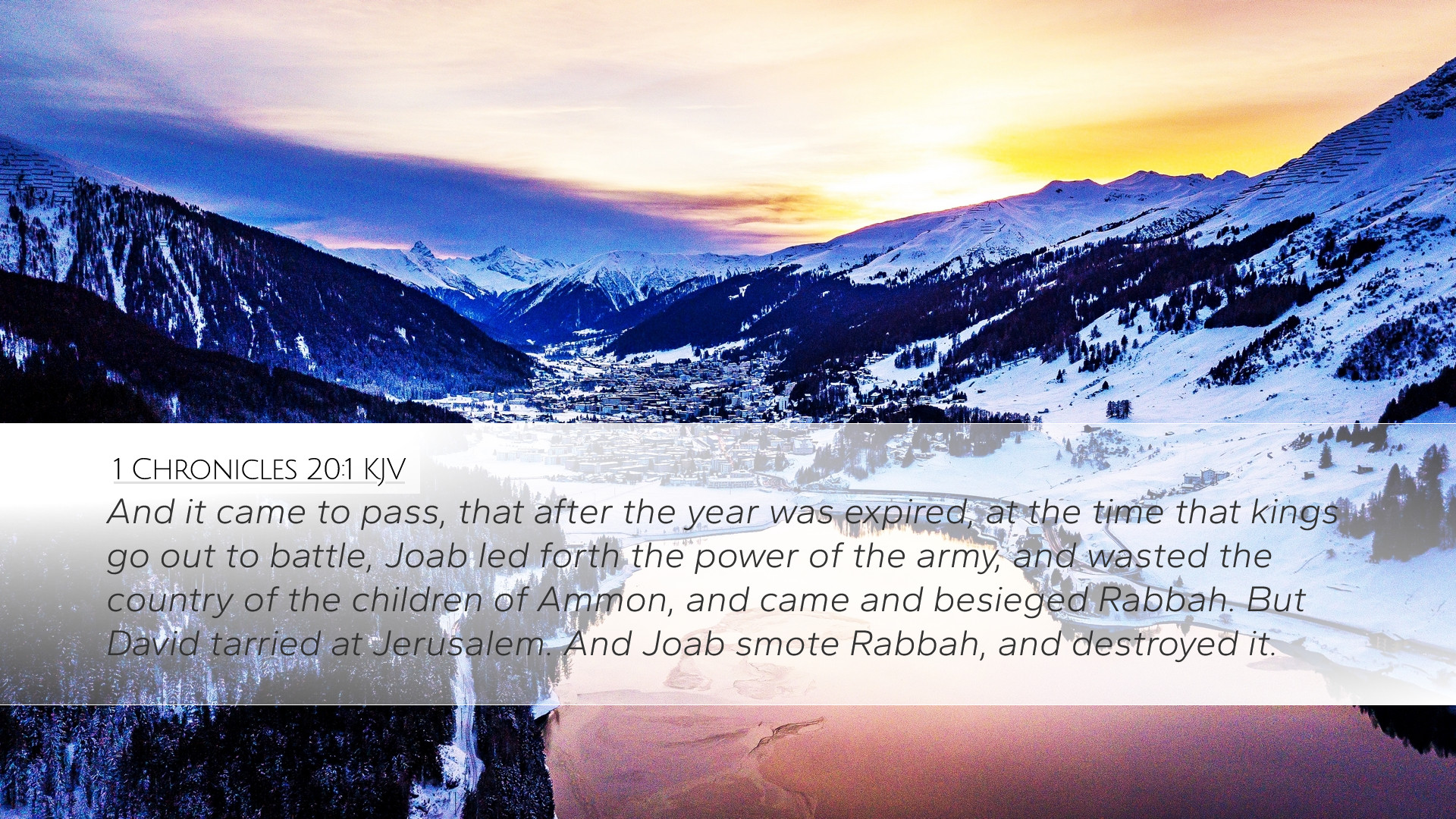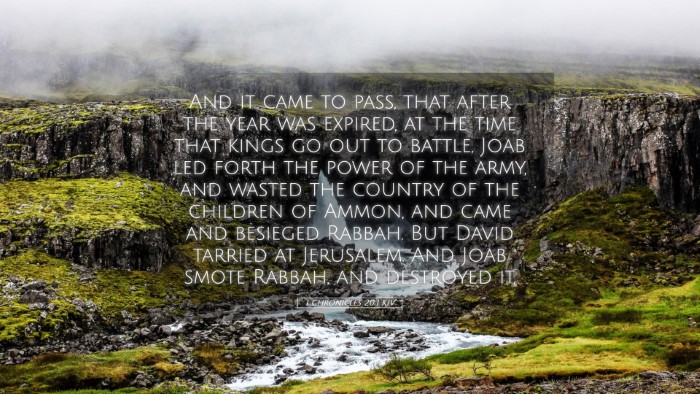Commentary on 1 Chronicles 20:1
Bible Verse: "And it came to pass, that after the year was expired, at the time that kings go out to battle, Joab led forth the power of the army, and wasted the country of the children of Ammon, and came and besieged Rabbah. But David tarried at Jerusalem. And Joab smote Rabbah, and destroyed it."
Introduction
The narrative of 1 Chronicles 20:1 provides a significant glimpse into the military campaigns of Israel under King David, focusing particularly on the actions of Joab, David's military commander. This verse opens a window into the dynamics of leadership, warfare, and the consequences of a king's choices. Through the insights provided by various public domain commentaries, this analysis will uncover the ramifications of David's absence from the battlefield, the nature of the conflict with Ammon, and the theological implications therein.
Historiographical Context
1 Chronicles, distinct in its emphasis from the parallel account in 2 Samuel, offers a retelling that seeks to underline the sovereignty and faithfulness of God throughout Israel’s history. The chronicler presents a theological understanding of events; in this manner, the verse serves as a means to display God’s supremacy over Israel’s enemies.
Matthew Henry emphasizes the historical setting of this verse, noting that it takes place after the spring season—the traditional time for kings to lead their armies into battle. We find David’s strategic leadership contrasted with Joab’s military actions, which prompts essential reflections on the nature of authority and obedience.
Key Characters
- David: The king, whose decision to remain in Jerusalem during the campaign underscores a pivotal moment in his reign. His absence raises questions about leadership and divine protection.
- Joab: David's chief military officer, whose effectiveness in leading the army while the king remains behind reveals his loyalty and capability, albeit sometimes exercised with questionable ethics.
Theological Insights
Albert Barnes elucidates that this verse illustrates a critical moment of moral and spiritual failure for David—a king who has historically been described as "a man after God’s own heart." His decision to remain in Jerusalem can be interpreted as a sign of complacency and potential neglect of his divine responsibilities.
Furthermore, Adam Clarke notes that Joab's assault on Rabbah symbolizes not just military victory but also a fulfillment of divine judgment against the Ammonites, who had previously mistreated Israel. The military action takes on a dual role of nation defense and divine retribution.
War and Leadership
The spring campaign against the Ammonites offers a platform for discussing the nature of warfare as presented in Scripture. The phrase "kings go out to battle" is indicative of the communal norms of leadership in ancient Israel, where military endeavor was part and parcel of kingship. Matthew Henry posits that David's detachment from the battlefield raises critical reflections for modern leaders regarding the importance of presence in leadership roles.
It can be seen that Joab's military prowess led to a significant conquest over Rabbah. The chronicler’s record of Joab "smoting and destroying" was not merely a remark on military success; it also speaks volumes about the ultimate vindication of God’s people against their adversaries, showcasing that while human agents are vital, the divine purpose stands sovereign.
David's Isolation and Consequences
David's choice to remain in Jerusalem, despite the strategic need for his presence, opens discussions about the personal implications of leadership decisions. Barnes reflects on how this might be viewed as a lapse in duty that not only affects military outcomes but leads to personal temptation, which eventually develops into sin outlined in subsequent passages of the narrative.
Henry warns that leaders who separate themselves from their duties invite various forms of temptation, highlighting that David, alone in a time when he should have been in battle, becomes vulnerable to sin—a transition from passivity to the well-documented events of his ensuing moral crisis.
Calls for Reflection
The implications of this text for pastors, students, and theologians are profound. It raises crucial questions about the responsibilities of leadership, the ethical dimensions of decision-making, and the consequences of neglecting spiritual duties. Joab’s decisive actions contrast with David’s inaction and serve as a reminder of how individual decisions can influence the broader narrative of community life.
In modern application, there is a pressing need for church leaders to examine their own positions—whether they are engaging actively in their ministry responsibilities or, like David, retreating into complacency. The essential takeaway from this verse is a call to vigilance and active leadership, ensuring that in all decisions, there is a focus on God’s glory and the well-being of the flock.
Conclusion
In summary, 1 Chronicles 20:1 serves as a powerful reminder of the dynamics of leadership amidst spiritual and military engagements. Through the collective insights of Henry, Barnes, and Clarke, we are invited to reflect upon themes of duty, temptation, and the overarching sovereignty of God. As we consider the ramifications of David's choices and Joab's actions, let us draw lessons for our own contexts. The passage teaches that leadership requires constant diligence, accountability, and an unwavering commitment to our God-given responsibilities.


